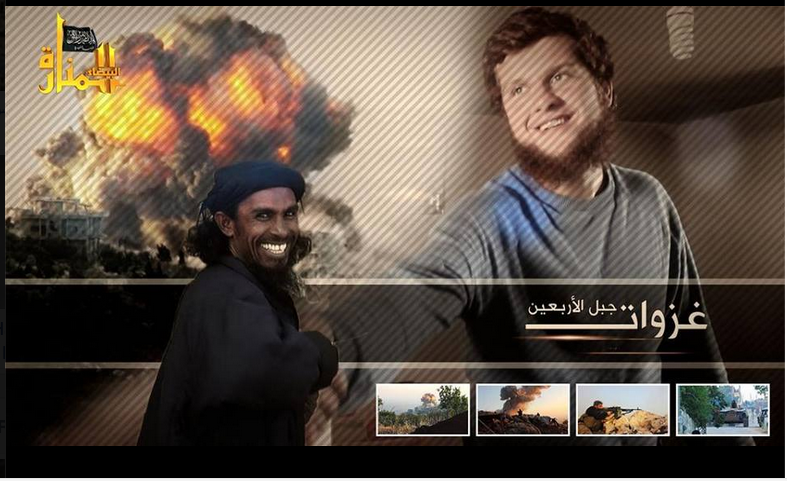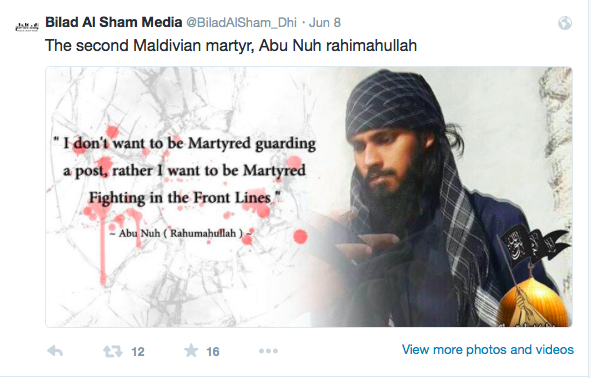The Clear Banner sub-blog on Jihadology.net is primarily focused on Sunni foreign fighting. It does not have to just be related to the phenomenon in Syria. It can also cover any location that contains Sunni foreign fighters. If you are interested in writing on this subject please email me at azelin [at] jihadology [dot] net.
—
From Paradise Now To Paradise Hereafter: Maldivian Fighters In Syria
By Dr. Azra Naseem
The young man was on his way to school when Ali Adam first saw him. He was a high achiever; among national Top Ten in the GCE O’Level examinations1. Every day after school the young man worked in a shop. That’s where Adam met him next. Slowly, Adam cultivated a relationship with him until he became a close friend. This is when Adam’s real work began.
Everyday the two friends met. They discussed religion. Adam always started the discussions with stories about the plight of Muslims living in countries like Palestine, Pakistan, Yemen and Syria. The stories were meant to arouse the young man’s sympathies. When they ended, the young man understood ‘Jihad is a duty.’ Half of Adam’s work was done.
About six months later, Adam began the second phase of his work: to take the young man as far as Pakistan. Adam first accompanied him to India. The young man’s parents cried, begged him not to go. Their pleas fell on deaf ears. The young man’s sister was a student in India; she, too, decided to go with him. He wanted to take another woman with him. Adam only agreed on condition the young man married her. About five people were gathered together and a wedding was quickly performed.
“When we got to Pakistan, a Lashkar–e–Taiba agent said the marriage was not valid. We were told to return home. I came to Male’. The young man’s sister went back to study in India. He stayed in Pakistan for about five years, doing odd jobs,’ Adam said, when asked what the most memorable events in his story were.
Adam says he is a recruiter who finds Maldivians to fight in Syria. About a year ago, he ‘saw the errors of his ways’ and stopped the work. He described his job, and that of his co-workers, as operating within ‘a major network’. It is an endless task, beginning with collecting funds and recruiting people in the Maldives.
[…]
The recruitment work is done in parallel with procuring finance. Adam described the recruitment process step by step: sermons that encourage ‘Jihad’ are given in mosques like Dharumavantha Mosque where people hold the Friday prayers in a separatist congregation [away from the mainstream mosques]. Some people travel to outer islands on the pretext of teaching Quran recitation and providing religious counselling. Envoys are also sent to Maldivian students in countries like Sudan, Egypt and Yemen to enlist their support. They look for people ‘who can be easily convinced’, and seek to ‘play with their minds’.
According to Hussein Rasheed, who was arrested at Male’ airport en route to Syria, Maldivian fighters travel to Syria via Sri Lanka, India or Thailand – all popular travel destinations with Maldivians. The would-be fighters stopover at these destinations [for varying lengths of time] before travelling to Turkey to cross the border into Syria. That’s when ‘Jihad’ begins. They don weapons, and carry out suicide attacks.
‘I know 15 to 20 Maldivians who are in Syria right now. This includes a woman, too. Some Maldivian students who had been studying in Egypt, Sudan and Yemen lead these fighters. One of them has a family in Syria, including a baby. All Maldivians are fighting with Al-Qaida affiliated Jabhat Al-Nusra’, Rasheed said.
What type of Maldivian goes to Syria? Do any of them want to return to Maldives? What happens to their families [in Syria] if one of them dies in battle? All questions.
‘I know that among the fighters are people who have been convicted and sentenced in relation to the Himandhoo case and in connection with the Sultan Park bombing. I don’t think anyone who went there has returned. I doubt any would. If one of them dies, someone else will marry his [the deceased man’s] widow. Expenses will also be looked after, and money given,’ Rasheed, who was arrested last year, said in answer to those questions.
[…]
The above text is a translation of an article in Maldivian daily newspaper, Haveeru, published on 4 June 2014, shortly after the first Maldivian died fighting in Syria2. It serves as an introduction to a growing problem confronted by Maldives – a steady increase in the number of people leaving for ‘Jihad’ in Syria.
Background
Officially, the Maldives is a ‘100% Muslim’ country. The state religion is Islam, and its constitution stipulates every citizen must be a Muslim. Only a Sunni Muslim can be President, or become a judge. Despite what the legal stipulations may suggest, for centuries Islam in Maldives has been fundamentally different from the strict, fundamentalist Islam practised in some ‘Islamic states’. Both the island culture and the centuries old pre-Islamic Buddhist history, as well as its remote geography and distance from the ‘Islamic world’ leant itself to the evolution of an Islam that, while adhering to the five basic tenets of the religion, reflected few of the common practises and jurisprudence followed by other ‘100% Muslim’ countries. This, however, changed drastically in the 21st Century, especially after the United States-led War on Terror began. With seemingly unlimited funding from Islamist societies and organisations—mostly Saudi Arabia—Islam that follows the teachings of ‘Revolutionary Islamism’3 has become predominant, side-lining the country’s Traditionalist Islamic practises with astounding success4.
Dying in Syria

Figure 1. Abu Turab (L) first Maldivian known to have died fighting in Syria
The first Maldivian fighter known to have died in Syria was a 44-year-old named as Abu Turab He was later identified as Ali Adam from the island of Feydhoo in Shaviyani Atoll5.
Two days later, another man, Abu Nuh, was reported killed in Syria. He was later identified as Hassan Shifaz from the capital island of Male’. Since then, around a dozen Maldivians are known to have died fighting in Syria.

Figure 2 Abu Nuh, second Maldivian to die in Syria
Authorities differ greatly on the number of Maldivians who have travelled to join the war in Syria. The most recent police estimate put the figure at 50, while the Maldivian Democratic Party (MDP) puts the figure at around 200. While it is hard to get an accurate figure, judging from the number of reported deaths and the increasing numbers reported as leaving for Syria, the police estimate is ultra-conservative and, not unintentionally, misleading. The Maldives Police Service and the government have been largely6 unable or unwilling to address the issue. This is not surprising, given the links said to exist between the government, Islamists and law enforcement authorities7. At the UN Human Rights Council’s Universal Periodic Review in Geneva on 6 May 2015, Maldivian Foreign Minister Dunya Maumoon denied any Maldivian links to terrorism, and refrained from making any reference to the growing number of people leaving to Syria.
In contrast to the government’s reluctant admission to existence of limited extremism, the opposition has, for several years now, highlighted religious extremism as a major concern. Their figure of 200 fighters in Syria, however, appears inflated—at least for now. A more accurate figure would be somewhere in-between. From a population of just over 300,000 this is still a shockingly large number. There are more Maldivian fighters in Syria than there are from Afghanistan or many other countries in the Middle East8.
‘Hijra’ in large groups
In October 2014, Ahsan Ibrahim (23) left for Syria with his mother, wife and 11-year-old sister. They left their island Meedhoo, in Raa Atoll, on the pretext of seeking medical treatment in the capital Male’. Ali Ibrahim, father of Ahsan and the 11-year-old girl, only became aware of their plans a week later. In the five months since, Ali Ibrahim has only heard from his family once. ‘We are in Iraq’, Ahsan told his father in a phone call made on Viber. Ahsan told his father they have no intention of returning to the Maldives, which he described as ‘a land of sin’. They left it behind to be ‘on the right path’. With help from Maldivian authorities Ali Ibrahim confirmed his family has crossed the Turkish border into Syria, but he has no way of knowing whether his wife and children are dead or alive.9
Increasingly, Maldivians are leaving for Syria in large groups. This new trend can be spotted from early January 2015 onwards, when it was reported that a group of seven Maldivians had left together for Syria. It was also the first time connections emerged between dangerous criminal elements in society and those travelling to Syria. All seven members of the group belonged to a criminal gang. Among them was Azleef Rauf, a notorious gangster accused of involvement, among other violent crimes, in the murder of Dr Afrasheem Ali, an MP and a religious scholar known for relatively moderate views. The group entered Syria via the Turkish border. According to local media reports, Azleef planned to take his pregnant wife, one-year-old son and four-year-old daughter with him but was prevented by the wife’s family.10
Another group of six, en route to Syria to join with Azleef’s group, were stopped in Malaysia and returned to the Maldives on 12 January 2015. Their plans were reported to the police by a family member and four were stopped by a joint operation by Malaysian and Maldives police. Whereabouts of the other two are unknown, but they are believed to be in Indonesia11.
Another group of six Maldivians left for Syria on 29 January 2015. The group included the Imam of a mosque in capital Male’,



